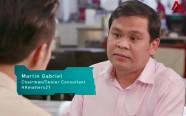Part II The Interview
 When you are called up for interview, likelihood is your battle is half won; the hiring manager has already decided that your skill-set/experience is right.
When you are called up for interview, likelihood is your battle is half won; the hiring manager has already decided that your skill-set/experience is right.
So, you just need to convince the interviewers that you are best-suited and establish a good connection. Be courteous to all staff including the receptionist. Put your mobile phone on silent vibrate mode before the interview so that if your recruitment company or interviewer needs to contact you just before the interview, you are still contactable. However, do not answer any calls and messages once you have met the interviewer.
2.1 Punctuality
Being punctual indicates professionalism and respect for your interviewer’s time. Find out the exact location and how to get there, a day before. Being punctual helps you relax – imagine arriving late, flustered and nervous. Arrive 10-15 minutes earlier, as you may have to fill up forms or be briefed prior to the interview.
2.2 Be Calm
Arrive early, breathe deeply, relax, review your information, visualise positive mental images of positive outcome and do some “self talk”.
2.3 First Impressions
First impressions are formed when your potential employer contacts you for an interview. Feedback from the receptionist or any person you have made contact with can also make or break your chances. Be sincere and project a positive image.
2.4 Handshake
Maintain eye contact while shaking hands – engage hands, make eye contact and exchange smiles.
Let your handshake convey honesty, self confidence and comradeship. Imagine getting a limp handshake which may translate a cold, indifferent, unemotional personality, or a wet, crushing handshake. What is your impression of someone who quickly holds and drops your palm with just a few fingers and thumb but without his palm? Be aware of the impression and qualities you are projecting when you give a handshake.
2.5 Display a Positive Attitude, Maintain a Positive Mindset
One purpose of the interview is to assess if you will fit the company and the role well, so be yourself and present yourself in the best manner. Maintain good posture, proper body language and eye contact during the interview. Also, be polite, tactful and demonstrate professionalism to everyone you come in contact with.
Communicate clearly in proper diction and steer away from using “Singlish”. Do not give monotonous, monosyllabic answers. It would defeat the purpose of an interview if you appear nonchalant and disinterested to provide more information about yourself, then again, exaggerating your accomplishments creates a negative impression also.
Remember that every interview is a fresh opportunity, so do not let your past disappointments encumber your interview!
2.6 No Badmouthing
Never speak negatively about your previous jobs or bosses. Badmouthing gives your interviewer “imaginings” about how you will speak about him when you leave!
2.7 Know your CV well
Remember your dates, designations, key achievements, skills, courses you have attended, etc. Being unable to recall your own history and explain gaps between jobs, it may appear to your interviewer that you are providing false information.
2.8 Share your Accomplishments
When asked about your strengths, accomplishments, give examples of situations even if they were from a few positions ago. Even if they are examples from your volunteer work which illustrates relevant skills and merits, do include them.
2.9 Understand the Questions
If you do not understand the question, take a moment to clarify it so that you can best address it. Mention your best accomplishments when answering as it may be an indication to the interviewer of possible results you may deliver, base on your “past record”.
2.10 Do you have any questions for me?”
Make a note of questions you may have about the organisation, department or role you will fill. It will be a shame if you eventually turn down a role due to insufficient information. Asking questions also indicates your interest in the position and it may provide some indication on your chances base on how your interviewer replies.
At the end of the interview, you can also ask when you will expect to hear from them, their answer may indicate their interest level and timelines, which will allow you to ascertain how to approach other opportunities.
2.11 Practise
There are some standard questions that are asked during interviews so practise your answers before the interview.
Written by Rebecca Chong, From
CORNERSTONE CAREER CONNECTIONS PTE LTD
100 Beach Road #24-07, Shaw Tower, Singapore189702 Voice: +65 6391 0230 | Fax: +65 6293 5771
csadmin@cornerstone-career.com EA License No: 07C3678





